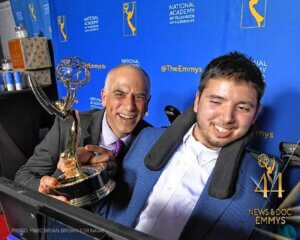The following article was published in the Concord Monitor on Sep. 29, 2023. All credit for this article and the images it contains belongs to the Concord Monitor. Samuel Habib is a student at NHTI – Concord’s Community College, and much of the documentary was filmed on NHTI’s campus in Concord.
By MICHAELA TOWFIGHI, Monitor Staff

As he accepted his Emmy in New York City, Samuel Habib was thankful and proud, but just like his award-winning film, he had a message.
“My goal for this film is that people won’t talk down to people with disabilities,” the 23-year-old Concord High School graduate told the crowd. “I want everyone to know that people with disabilities demand respect and rights.”
With a microphone held to the speaker of his computer-assisted communication device, he reiterated the themes of the coming-of-age film that he co-directed with his father, Dan Habib.
“I want other young adults with disabilities to have the same opportunities that I have had for healthcare, inclusive education, college, assistive technology, making friends and independent living,” Samuel said.
The father-son duo were honored for a documentary film they made about Samuel’s transition into adulthood, living with cerebral palsy and epilepsy, called My Disability Roadmap.
When My Disability Roadmap was announced as the winner in the Outstanding Soft Feature Story, Long Form category, immediate screams came from the Habib entourage. Then, it was a beeline for the stage, through an accessible route in the hallway of the Palladium Times Square, where Samuel could drive his 350-pound motorized wheelchair to the podium.
In My Disability Roadmap, the Habibs take viewers on a journey across the country, as Samuel asks questions of disability activists on what it is like to transition into adulthood.
In one scene, Samuel ask Joe Biden how he planned to support inclusive education for students with disabilities if he were elected president.
“You should be integrated into all the classes,” Biden says. “Because you’re smart, you’re smart, you’re smart. The disability does not define who you are.”
Biden touched Samuel’s cheek as he answered the question.
“I can’t believe he stroked my face,” Samuel says in the film. “Weird.”
Still, Samuel voted for Biden, submitting his ballot into the machine at his Concord polling place.
Like most people his age, Samuel wants to start dating. Someday, he wants to get married and have kids, he says in the documentary, which was produced by the New York Times.
“I don’t want to rely on my mom and dad so much,” he said in the film. “I want to figure out how to follow my dreams. But nobody tells you how to be an adult, let alone an adult with a disability.”
They set out to talk to “bad-ass people with disabilities who figured it out.” Perhaps one could become a mentor, Samuel wondered in the film.
One of those people was Judy Heumann. Samuel dedicated the film to her after she passed away in March.
The documentary has now received one of the highest forms of recognition, which serves to elevate the voices of anyone living with a disability, Dan Habib said in an interview on the drive back to Concord from New York.
“Samuel obviously has lived his whole life with a disability, that is his whole life experience. He has always felt and deserved a sense of belonging in all aspects of society,” he said. “But not everyone with a disability, in fact the majority of people with disabilities, don’t necessarily experience that.”
Instead, many people with disabilities often feel segregated from education, employment, housing, relationships, healthcare – you name it.
In the film, the Habibs not only began to answer some of Samuel’s questions – like how and when to start dating. But it also shows viewers the obstacles people with disabilities face as they try to access all parts of society.
This was not the Habibs’ first film together, either. In 2018, Dan chronicled Concord High School Principal Gene Connolly’s battle with amyotrophic lateral sclerosis, a disease that stole his ability to walk and speak, in a film simply titled, Mr. Connolly has ALS.
That film featured a video clip of Samuel and his principal communicating through fist bumps and hand gestures at a unified basketball game At the end of his tenure at Concord High School, Connolly was communicating through a device similar to Samuel’s.
Habib wanted to ask Connolly a question that is ever present in his experience as a parent of a son living with a disability – what does it feel like when people speak down to him, like when people speak to Samuel as if he was four years old?
Did people begin to question Connolly’s intelligence after he lost his ability to speak and walk?
“People don’t understand the disease. They think the disease has affected my cognitive abilities. While I look different, inside I am still the same person,” Connolly replied. “It can be frustrating and exhausting. I have a newfound respect for people with disabilities.”
Samuel, who is pursuing a career in multimedia storytelling, served as a consultant on that documentary.
After that aired, Habib was contemplating his next project with his son. They already built a long history of collaboration. In 2007, Habib released a film called Including Samuel, which addressed the family’s efforts to include Samuel in every facet of their lives. Fifteen years later, father and son told the story together.
“All of our work has centered on elevating the perspectives of disabled people,” he said. “We just decided this would be a really fun and meaningful and exciting project to do together.”

